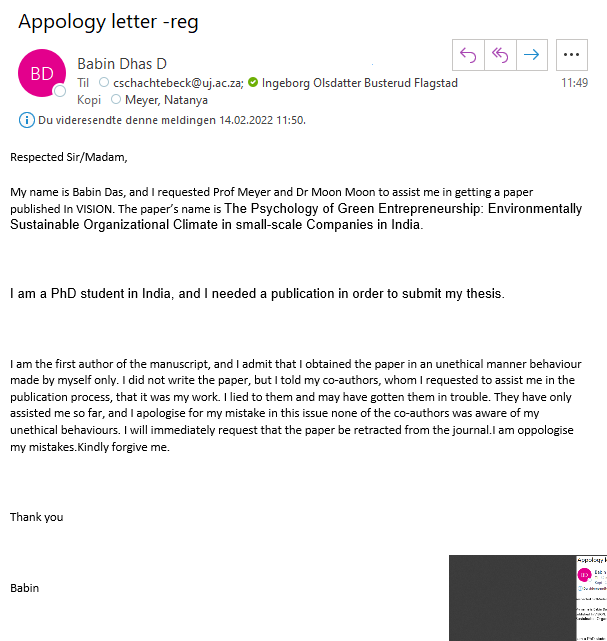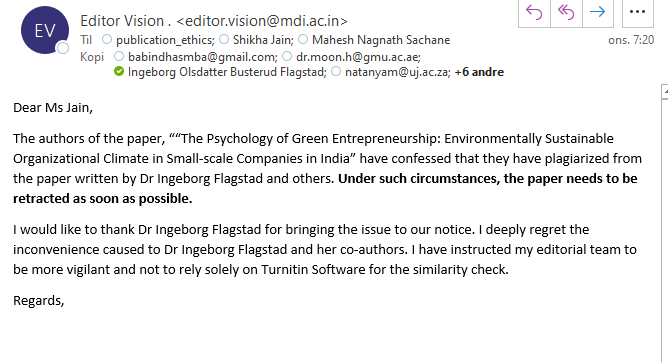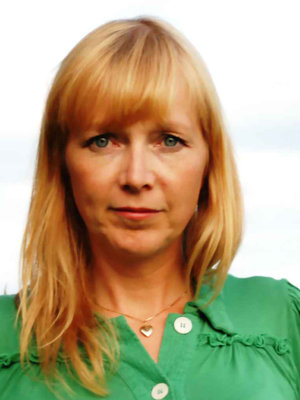Svein Åge K. Johnsen and Ingeborg Olsdatter Busterud Flagstad, of the Inland Norway University of Applied Sciences, have been trying to publish a manuscript on the psychology of green entrepreneurship.
In January 2021, they submitted it to the International Small Business Journal, a SAGE publication. The editors rejected it without sending it to peer review. So did The Journal of Entrepreneurship, another SAGE title. So Johnsen and Flagstad submitted it to Cogent Business & Management, a Taylor & Francis title.
And then, on December 25, as perhaps the worst Christmas present ever, they saw the paper published – by someone else.
Only there were a few differences between their manuscript and the one that appeared in Vision: The Journal of Business Perspective, also a SAGE title. While the manuscript Johnsen and Flagstad had submitted – and which is still under review – is about “small-scale Norwegian manufacturing companies,” the Vision version had all of the same data, findings, and discussions – but was somehow about “small-scale auto ancillary companies in India.”
Johnsen and Flagstad contacted Vision, as well as SAGE. On Feb. 13, the first author, Babin Dhas Devadhasan, of Loyola Institute of Technology, in Chennai, India, wrote to Flagstad and Seetharampalayam Chettiannan Vetrivel, the last author of the paper, to say he wanted to retract it.
A day later, Devadhasan wrote an apology:

And a day after that, Natanya Meyer, one of the co-authors – who Flagstad told Retraction Watch was very helpful throughout the process – wrote to the editor of the journal to follow up:

And on Feb. 17, the editors confirmed that that paper would be retracted:

So how did Devashasan – who has not responded to a request for comment from Retraction Watch – come to plagiarize a paper that hadn’t yet been published?
“We suspect that it was in this review process that the article has been stolen,” Flagstad said, “and we are in dialogue with Cogent.”
Like Retraction Watch? You can make a one-time tax-deductible contribution by PayPal or by Square, or a monthly tax-deductible donation by Paypal to support our work, follow us on Twitter, like us on Facebook, add us to your RSS reader, or subscribe to our daily digest. If you find a retraction that’s not in our database, you can let us know here. For comments or feedback, email us at [email protected].

I hope that the involved institutes also scrutinise their scientists.
– If the article was stolen off the shelf and was more or less published as is, did they agree (or insist) to be co-authors on a paper to which they had zero contribution?
– The PhD director must have been aware of the research that the PhD candidate was conducting. Therefore, I would not necessarily take the “confession email” as the place where the buck stops.
In the first screen shot, Babin’s email address is shown — perhaps this is not needed for the readers of this blog?
Fair point, updated.
This is the nightmare scenario that every academic fears but is repeatedly told never happens and can’t happen. Sure, it’s incredibly rare, but I can imagine this story to raise the anxiety levels of many looking to publish.
This is why preprinting own’s manuscript is so important.
“We suspect that it was in this review process that the article has been stolen,” Flagstad said, “and we are in dialogue with Cogent.”
It sounds as if Cogent rejected the paper because of a dishonest review from a PhD student.
1 Department of Management Studies, Loyola Institute of Technology, Chennai, Tamil Nadu, India
2 College of Healthcare Management & Economics, Gulf Medical University, Ajman, United Arab Emirates
3 University of Johannesburg, Johannesburg, South Africa
4 School of Management Studies, Kongu Engineering College, Erode, Tamil Nadu, India
Yes, we always expect this diversity of affiliations on a paper about small-scale companies in India.
I’ve always been suspect of decisions through individuals and small committees whose decisions have direct bearings on their own fortunes and well being. That is why I am suspect of submitting academic articles and applying for grants and suppling too much detail.
Reading Babin Dhas Devadhasan’s apology — major problem — says his co-authors did not know the paper was unethically obtained — who let’s themselves be named as a co-author knowing so little about the ms. Yikes.